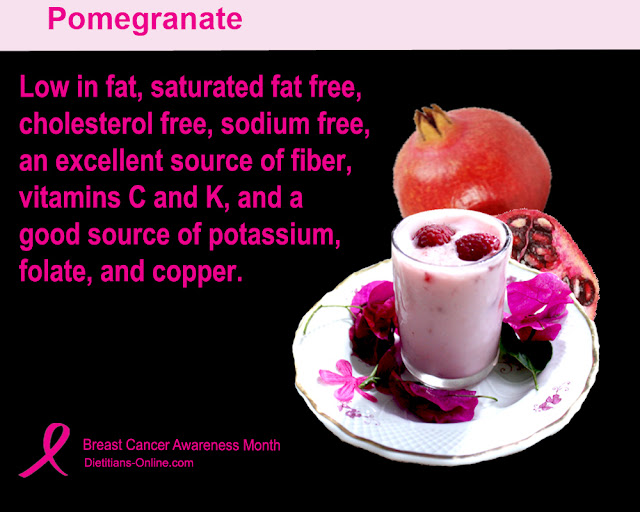The Power of Pink
Pink Grapefruits contain lycopene. Lycopene is a naturally occurring chemical that gives fruits and vegetables a red color. It is one of a number of pigments called carotenoids. Lycopene is a powerful antioxidant that may help protect cells from damage. Current research is exploring the role of lycopene in relation to preventing heart disease and cancer of the prostate, breast, lung, bladder, ovaries, colon, uterus, and pancreas.
Pink Salmon is a good source of omega-3 fatty acids. In addition, pink salmon is rich in calcium, protein, magnesium and potassium; and contains iron, niacin, selenium, and vitamins A, B-12, C and E. Research shows that omega-3 fatty acids may reduce inflammation and help lower risk of chronic diseases such as heart disease, cancer, and arthritis. Omega-3 fatty acids are highly concentrated in the brain and appear to be important for cognitive (brain memory and performance) and behavioral function.
Beets are a good source of fiber, potassium and folate. Researchers believe the red pigment (called betacyanin) in beets may protect against the development of cancerous cells and might play a role in reducing the inflammation associated with heart disease.
Raspberries contain high levels of ellagic acid, a polyphenol and antioxidant being studied as a food in the fight against cancer. Raspberries are also rich in anthocyanins, a flavonoid compound that gives them their red color. Anthocyanins may help protect the circulatory, cardiovascular and neurological systems. Raspberries are a rich source of vitamin C, manganese and dietary fiber; and is a low-glycemic index food.
Red Onions are a natural sources of quercetin. Quercetin is a bioflavonoid and has antioxidant and anti-inflammatory properties. Quercetin is being studied for treating conditions of high cholesterol, heart disease, circulation problems, diabetes, cataracts, peptic ulcers, inflammation, asthma, gout, chronic fatigue syndrome, preventing cancer, and for treating chronic infections of the prostate. Quercetin research is evaluating the effectiveness of increased endurance and improved athletic performance. Red onions also provide allicin, an organic sulfur compound responsible for the taste and smell of onions. Allicin may protect against inflammation, allergies, and bacteria; and may reduce the risk factors of certain types of cancers.
Guavas are rich in dietary fiber, vitamins A and C, folic acid, potassium, and manganese. A guava contains about 4 times the amount of vitamin C as an orange. Vitamin C is an antioxidant, which helps, protects cells from free radical damage. Currently there is insufficient evidence to rate the effectiveness of guava in the treatment of colic, diarrhea, diabetes, cough, cataracts, high cholesterol, heart disease, cancer, and other conditions. More research is needed to evaluate the usefulness of guava for these conditions.
Yogurt, Raspberry, Low Fat or Fat-Free Yogurt has been associated with a wide range of health benefits, due to its bacterial cultures and the many nutrients it contains. Yogurt is an excellent source of protein, calcium and potassium. Some research shows that yogurt with probiotic cultures may help improve the immune system; reduce yeast infections in women; help with digestion; and reduce colon and other cancer risks. Calcium has beneficial effects on bone mass and may help prevent osteoporosis. Many people who are lactose intolerant can enjoy yogurt. One serving of yogurt is one eight-ounce cup or serving.
National Breast Cancer Awareness Month
NBCAM Organizations Working Together
NBCAM Organizations Working Together
------------------------------------------------------------------------------------------------------------
References. National Breast Cancer Awareness Month
American Cancer Society (ACS) www.cancer.org
American College of Obstetricians and Gynecologists www.acog.org
American College of Radiology (ACR) www.acr.org
The American Society of Clinical Oncology (ASCO) www.asco.org
The American Medical Women's Association (AMWA) www.amwa-doc.org
CancerCare www.cancercare.org
National Medical Association (NMA), www.nmanet.org
The Oncology Nursing Society (ONS) www.ons.org
Prevent Cancer Foundation www.preventcancer.org
Susan G. Komen for the Cure® www.komen.org
Centers for Medicare & Medicaid Services (CMS) www.cms.gov
National Cancer Institute (NCI), www.cancer.gov
References. National Breast Cancer Awareness Month
American Cancer Society (ACS) www.cancer.org
American College of Obstetricians and Gynecologists www.acog.org
American College of Radiology (ACR) www.acr.org
The American Society of Clinical Oncology (ASCO) www.asco.org
The American Medical Women's Association (AMWA) www.amwa-doc.org
CancerCare www.cancercare.org
National Medical Association (NMA), www.nmanet.org
The Oncology Nursing Society (ONS) www.ons.org
Prevent Cancer Foundation www.preventcancer.org
Susan G. Komen for the Cure® www.komen.org
National Cancer Institute (NCI), www.cancer.gov

































